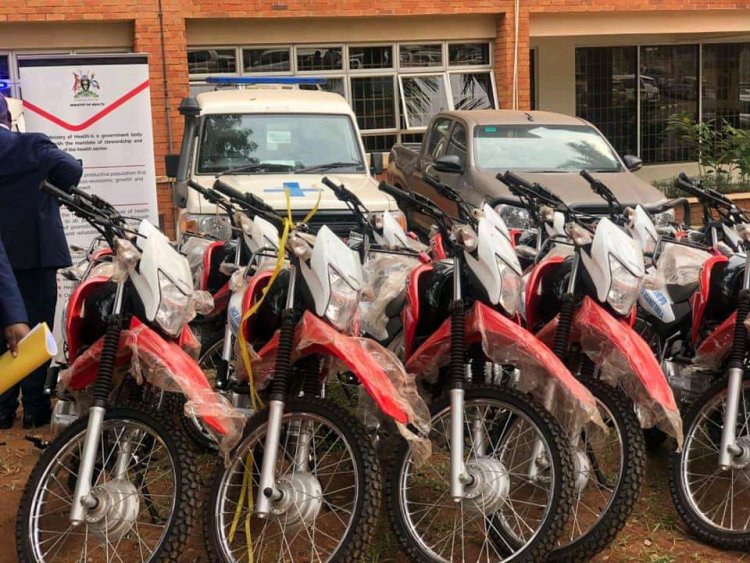Hard-to-reach areas in West Nile receive ambulances
Ambulances will be used for timely access and referral to health facilities for mothers and children who need emergency services

The Ministry of Health has received three ambulances procured with support from United Nations Children’s Fund – UNICEF and financial assistance from the Government of Sweden. The ambulances will be deployed in Pakwach, Madi-Okollo and Obongi District Local Governments in the West Nile Region, to support timely referral and transportation of women and children with complications to health facilities.
Complications due to pregnancy and childbirth and during the neonatal period remain the leading causes of maternal and newborn deaths in Uganda. Nevertheless, communities especially those in hard-to-reach areas continue to experience delays in accessing health facilities in a timely manner, putting at risk more mothers and their babies.
Many of the delays are due to lack of transportation, lack of funds to pay for transport, poor road infrastructure and poor communication networks. In the three youngest districts of West Nile - Pakwach, Madi-Okollo and Obongi, the situation is not different.
“Strong referral systems are critical if we are to reach every child and mother with health care services,” said Dr. Diana Atwine, Permanent Secretary, Ministry of Health. “There is no doubt that with the ambulances we have received today, we will reach many more mothers and children in need of health care services and with complications to save their lives.” Dr Atwine further appreciated the timely support from UNICEF and the Government of Sweden in improving health service delivery.
The support will therefore significantly address delays in accessing transport for mothers and children, with complications and residing in remote places to ensure they access health facilities in time, as well as support inter-facility referrals for emergency cases.
Improving referral systems, linkages between communities and facilities and timely transfer between the different levels of health facilities is a key priority for the Government of Uganda, an area partners like the Government of Sweden and UNICEF are investing in.
“As we collectively work towards improving the quality of services that these facilities provide, it is extremely important that the most vulnerable populations - pregnant women and sick children – can easily access services when they most need them and that we collectively commit to maintaining functionality and proper use of the resources we have,” said Ola Hällgren, Head of Cooperation at the Embassy of Sweden.
“Supporting access to quality essential health services also means continuous capacity building for frontline health workers, ensuring that medicines, supplies and basic equipment are available, and that service delivery is routinely monitored for timely redress of challenges. That is why we in July increased our support to UNICEF with US$ 4.4 million, to support Uganda’s COVID-19 response and mitigation efforts towards the continued delivery of essential health services for pregnant and breastfeeding women, newborns, young children, and adolescents. Sweden remains committed to supporting reproductive, maternal and child health in Uganda, especially during the current challenges faced by vulnerable populations brought about by the COVID19 pandemic.,” Mr. Hällgren added.
UNICEF continues to focus on improving the quality of services at health facilities and supporting physical access to essential health services especially for mothers and children by addressing the barriers, including the prohibitive transportation costs of reaching health facilities for deliveries and when complications happen. The interventions will address the major delays that prevent timely access of health care services by the mothers, newborns and children.
The Acting UNICEF Representative in Uganda Mr. Shadrack Omolo, thanked Sweden for their support.
Mr. Shadrack emphasized that “the focus to address transport barriers, especially in the context of COVID-19 is timely. We can help save lives by making sure that every pregnant mother and child receives the support they need to reach the facility before it is too late.”
UNICEF has partnered with the Embassy of Sweden since 2017, focusing primarily on improving reproductive, maternal, newborn, child and adolescent health (RMNCAH) services in West Nile.
The funding provided to West Nile through UNICEF is being invested at facility and community levels, in maternal, newborn, and child health services and Water, Sanitation and Hygiene infrastructure and has contributed to the ability of health facilities and hospitals across West Nile to comprehensively manage pregnancy-related and newborn complications.
In July 2020, Sweden supplemented the RMNCAH programme by providing an additional US$ 4.4 million to support the Ministry of Health in its response to COVID-19, including for Personal Protective Equipment for health workers, Oxygen Therapy, improvements of Water, Sanitation and Hygiene in health facilities and establishment of High Dependency Units for maternal health.












